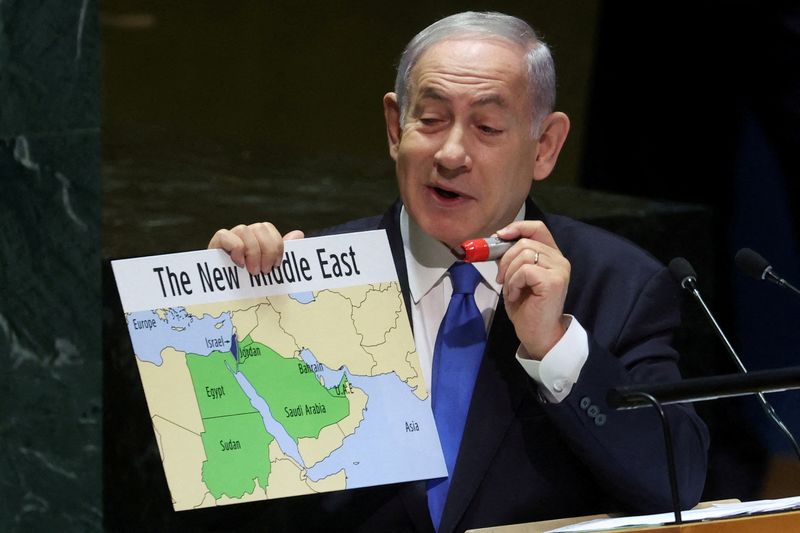By Henriette Chacar
JERUSALEM (Reuters) - Israeli Prime Minister Benjamin Netanyahu has presented his first official "day after" plan for the Gaza Strip once the war ends, saying Israel will keep security control over Palestinian areas and make reconstruction dependent on demilitarisation.
The plan, which brings together a range of well-established Israeli positions, underlines Netanyahu's resistance to the creation of a Palestinian state which he sees as a security threat, without explicitly ruling one out at some future stage.
It was swiftly dismissed by Palestinian officials as doomed to failure.
The document, distributed to security cabinet members as a discussion paper rather than a set programme, proposes Israel would maintain security control over all land west of Jordan, including the occupied West Bank and Gaza - territories where the Palestinians hope to establish an independent state.
The plan comes amid intensifying international calls to end the fighting that has destroyed large swathes of Gaza and to revive efforts to establish a Palestinian state alongside Israel.
U.S. President Joe Biden, Israel's main ally, has said that only a two-state solution has a chance of bringing long-term peace and has been engaged in intense diplomatic efforts to build support among regional and other states.
Hours after it was revealed, U.S. Secretary of State Antony Blinken said Israel's expansion of settlements in the occupied West Bank was inconsistent with international law, signalling a return to long-standing U.S. policy on the issue, which had been reversed by the previous administration of Donald Trump.
In the long-term goals listed, Netanyahu rejects the "unilateral recognition" of a Palestinian state. He says a settlement with the Palestinians will only be achieved through direct negotiations between the two sides - without naming who the Palestinian party would be.
In Gaza, it proposes replacing Hamas administrative control with local representatives "who are not affiliated with terrorist countries or groups and are not financially supported by them", setting demilitarisation and deradicalisation as goals to be achieved in the medium term.
"The prime minister's document of principles reflects broad public consensus over the goals of the war and for replacing Hamas rule in Gaza with a civilian alternative," a statement by the Prime Minister's office said.
The plan does not elaborate on when that intermediary stage would begin or how long it would last. But it conditions the rehabilitation of the Gaza Strip, much of which has been laid to waste by Israel's offensive, on its complete demilitarisation.
On Friday, as the plans became public, efforts to achieve a pause in the fighting to allow the return of some of the 134 hostages held by Hamas continued ahead of the Muslim holy month of Ramadan which begins in March.
Israeli ministers have said that unless a deal is reached, Israel will launch its long-awaited operation against the southern Gaza city of Rafah, where more than a million Palestinians have sought shelter under increasing dire humanitarian conditions.
'INDEPENDENT PALESTINIAN STATE'
Zaha Hassan, a human rights attorney and fellow at the Carnegie Endowment for International Peace, said if implemented, the Netanyahu plan would leave Palestinians in Gaza in a state of complete dependency, with no hope of achieving their national aspirations.
"This is obviously not the plan the Biden administration has been discussing with Arab governments," she said.
The spokesman for Palestinian President Mahmoud Abbas, Nabil Abu Rudeineh, said Netanyahu's proposal was doomed to fail, as were any Israeli plans to change the geographic and demographic realities in Gaza.
"If the world is genuinely interested in having security and stability in the region, it must end Israel's occupation of Palestinian land and recognise an independent Palestinian state with Jerusalem as its capital," he said.
To secure control of Gaza, Netanyahu proposes Israel have a presence on the Gaza-Egypt border in the south of the enclave and cooperates with Egypt and the United States in that area to prevent smuggling attempts, including at the Rafah crossing.
The plan calls for shutting down the U.N. Palestinian refugees agency UNRWA, which Israel has repeatedly accused of providing cover to Hamas, and replacing it with other international aid groups.
The war was triggered by a Hamas-led attack on southern Israel on Oct. 7 in which 1,200 people were killed and 253 taken hostage, according to Israeli counts.
Vowing to destroy Hamas, Israel has responded with an air and ground assault on blockaded Gaza that has killed more than 29,400 people, according to Palestinian health authorities. The offensive has displaced most of the territory's population and caused widespread hunger and disease.

Little progress has been made on achieving Palestinian statehood since the signing of the Oslo Accords in the early 1990s. Among the obstacles impeding it are expanding Israeli settlements in territories Israel captured in the 1967 Middle East war.
Most countries regard the settlements, which in many areas cut Palestinian communities off from each other, as a violation of international law. Israel claims a biblical birthright to the land and on Thursday said it would approve more than 3,000 new housing units in settlements.
